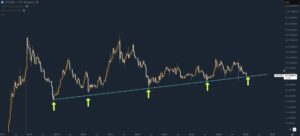Despite efforts to increase controversial environmental, social and governance (ESG) investments, companies are halting their efforts due to recession fears, per a report by accounting firm KPMG. But is this the only reason why institutions are quietly quitting ESG?
In October 2022, the big four firm published its 2022 US Outlook report, assessing various issues businesses will face over a 12 month period. These included economic turbulence, talent acquisition and technological developments. The report also considered the infamous ESG trend across the United States and the world.
The authors noted that a majority (79%) of the 1,300 CEOs surveyed think that the public will look to the private sector to address major social challenges rather than to governments, be it climate change or income inequality. But while this type of social investing has become important due to political pressure, the demand for increased reporting and transparency about ESG has also increased; especially as the public becomes aware of ‘greenwashing’, and sceptical over ‘virtue signalling’ ESG policies.
We will own nothing and be happy? No. We will own nothing and be miserable. We are witnessing a gigantic asset and freedom grab under the auspices of a virtue con-trick.
As I discussed with @MarkSteynOnline | @GBNEWS pic.twitter.com/cmajYqmHAH
— James Melville (@JamesMelville) November 17, 2022
This includes businesses expressing specific moral opinions which communicate a benevolent character, normally one that favours established talking points. Consumer scepticism is also on the rise as company products which are portrayed to be environmentally friendly or socially responsible aren’t necessarily so.
The key finding in the report is that 59% of CEOs say they ‘plan to pause or reconsider their ESG efforts in the next six months‘ to help prepare for an anticipated recession. Notably, a technical recession is said to have occurred following two quarters of negative GDP growth, i.e. the global economy is already in a recession.
The report suggested that diminishing investment in ESG strategies ‘may lead to long-term financial risk,’ as a possible recession tests CEOs’ commitment to the craze in corporate America and elsewhere. Seventy percent of CEOs noted that ESG efforts have improved their firms’ financial performance.
‘As CEOs take steps to insulate their businesses from an upcoming recession, ESG efforts are coming under increasing financial pressure,’ said global head of corporate affairs at KPMG, Jane Lawrie.
Eighty percent of CEOs expect a recession within the next 12 months, per the survey.
Are institutions abandoning ESG?
The increased scepticism over ESG comes in tandem with growing public awareness that ‘ESG’ is practically synonymous with ‘energy shortages’.
Retail investors are aware that the energy supply shortage is made worse by ESG policies. The public is also aware that if inflation does not trickle down, central banks will continue to raise interest rates. If this trend continues, the public and private sectors will default on their debt obligations. At the same time, the public is also aware that if central banks do not raise interest rates, then confidence in national currencies will collapse even further.
This awareness has given rise to ‘Anti-ESG’ ETFs taking off in the United States, with some states outright banning ESG-obsessed asset managers (like BlackRock) from using public money to fund their ideology.
One investor, Vivek Ramaswamy, executive chair of Strive, attracted $315 million in less than a month in October as ‘anti-woke’ sentiment garners support.
‘We are representing the voices of a lot of everyday citizens who have their money invested by other asset managers used to advance social and political agendas that they do not agree with. That’s a breach of their fiduciary duty, in my opinion. People are voting with their feet.’
As many as 29 states in the US plan to remove ESG idealogues.
Meanwhile, the European parliament has labelled gas and nuclear energy investments as green sources of energy in a tacit admission that it needs both to function. Notably, anything is better than burning coal, which is what EU countries have begun to do due to self-inflicted, ESG-induced energy shortages.
From a finance point of view, asset managers, megabanks and corporations are aware that they are partially, if not mostly responsible for the current energy shortage.
They are aware that ESG is merely a means to maintain economic and social control. They are also aware that the public is aware, which means it will be harder to push this ideology if interest rates continue to rise (due to increased borrowing costs to spend on ESG narratives). This awareness also lends itself to the value of their balance sheets, which will continue to fall and further restrict ideological, fact-free ESG spending as the energy crisis deepens. They are also aware that a continued political push for ESG will result in higher inflation and higher interest rates, which means they will become bigger enemies of society than they already are.
As the ESG backlash grows, it’s no surprise that asset managers are turning sceptical, if not outright abandoning ESG investments all together (hence the KPMG report). More compelling evidence of the ESG empire collapse came during the UN’s recent Cop27 climate summit in Egypt, where over 600 fossil fuel lobbyists were in attendance. The mere fact that they were allowed to attend speaks volumes about this energy-driven reality check for ESG fanatics.
The beginning of the end for the ESG movement?
As noted previously, ESG is merely a means to control the economic and social outlook. This is evidenced by all the inconsistencies, selection criteria as well as their own actions and investments. Recently discovered fraud Sam Bankman Fried alluded to this deception publicly while chatting with a VOX journalist following the unravelling of FTX, branding his deceptive rhetoric as a ‘dumb game we woke westerns play where we say all the right shiboleths and so everyone likes us‘.
These inconsistencies are why many former BlackRock executives have spoken out against ESG investing. The most recent former-exec, Terrence Keeley, summarised the entire scheme in three words: ‘it doesn’t work’. Such compounding issues may explain why most banks are ‘quiet quitting‘ on net zero policies just one year after their introduction.
This may also have something to do with the fact that people do not want to worry about whether their bank accounts will be closed if they buy too much fuel, purchase a weapon, or donate to the wrong political party, as was the case in Canada in February 2022. As pro-ESG companies cut their workforce, it’s also evident that ESG investing doesn’t generate any money. On the contrary, it only increases costs, per KPMG research. It follows that companies only conform to ESG policies in order to access credit from mega banks, as well as investments from their asset managers.
These mega banks in turn respond to not-so-subtle directives by the United Nations and the WEF, both of which want to achieve their sustainable development goals (SDGs) by 2030. While the details of the relationship between the two organisations is opaque, in the year 2000, the same organisations attempted a similar feat with so-called ‘millennium development goals’ (MDGs). These failed due to the 2008 financial crisis.
Under the current climate, a recession-induced ‘hard landing’ would thwart the entire operation. This is good because the planned ‘carbon credit’ system may never see the light of day.
Join the telegram channel for updates, charts, ideas and deals.
Did you like the article? Share it!


